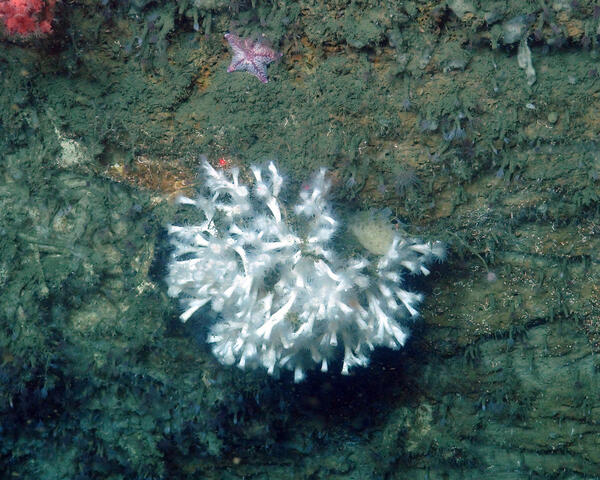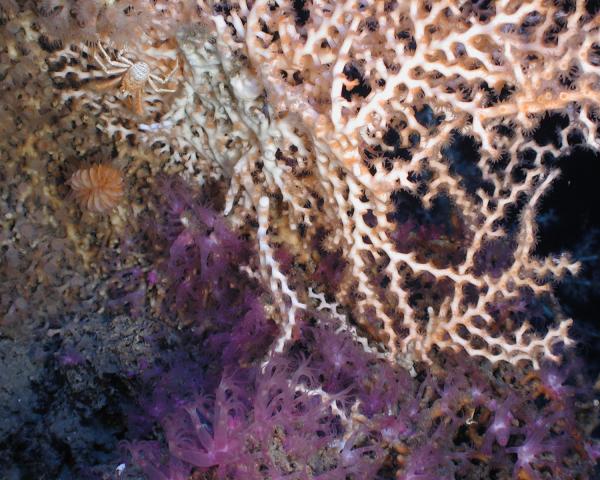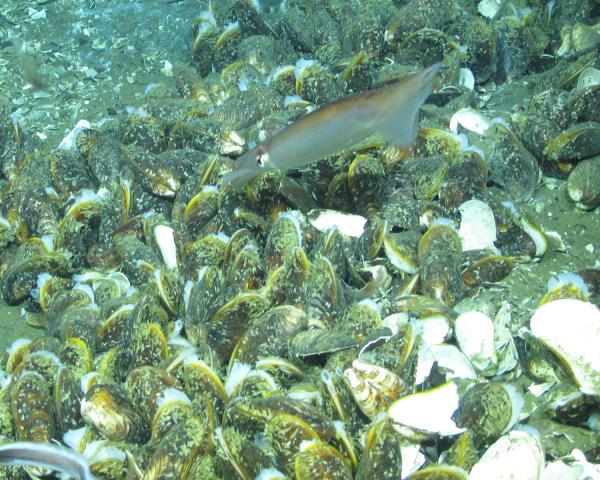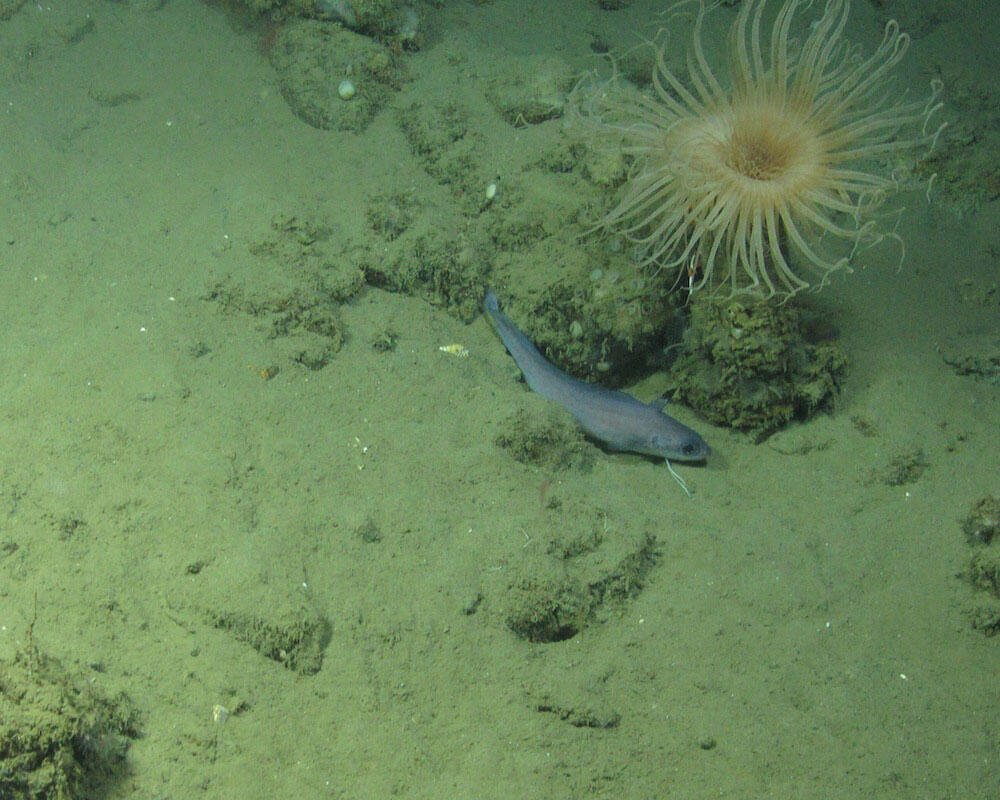DISCOVRE - Diversity, Systematics and Connectivity of Vulnerable Reef Ecosystems Project
This project uses amplicon sequencing, and functional microarrays to examine the microbiomes of several deep-sea coral species, with priority given to species that are also of interest to the population genetics group: Desmophyllum dianthus, Lophelia pertusa, Enallopsammia sp., and Acanthogorgia sp. The project also uses metagenomics to survey benthic habitats including coral mounds, cold seeps, and sediment.
Microbial Ecology of Deep-Sea Coral Ecosystems

Microbial ecology is the study of microbes (bacteria, archaea, fungi, viruses), how they interact with each other, their host if they are living on/in a plant or animal, and their environment. Microbes are responsible for important ecosystem services, including biogeochemical cycling, nutrient availability, and structuring ecosystems by providing settlement cues to some invertebrates.
Deep-sea Coral Microbiomes
Microbial associates have been shown to be key players in coral biology, serving functions such as fixing nitrogen, chelating iron, cycling waste products, and producing antibiotics to keep unwanted microbes from infecting the coral. There is evidence that many corals maintain conserved bacterial communities, distinct from the water column, sediments, and nearby corals of other species. The coral’s microbiome is also the most genetically adaptable part of the coral; faced with changing environmental conditions, the coral animal may take several generations to adapt, whereas the entire coral-associated microbial community (and all of its associated metabolic capabilities) can be changed on the order of hours to days.


Shifts in the coral-associated microbial community can also be used as diagnostics of coral stress, so it is critical to determine baselines prior to impacts (e.g., oil spill, environmental change) in order to determine the magnitude and effects of the changes. Characterizing the microbial communities associated with deep-sea corals in these environments will increase our knowledge of the biodiversity in these ecosystems and provide insight into the variability or uniqueness of the corals between different canyons, or between canyon and slope communities.
Benthic Metagenomes
Recently, researchers have begun using metagenomics to characterize the functional capabilities of an ecosystem, particularly in shallow coral reef systems. Water is sampled from just above the benthos and examined for all the microbial genes present, which can provide a picture of both which microbes are there and also the biogeochemical cycles these microbes are carrying out. This method will be used to examine and compare the microbial community functional abilities of deep-sea coral gardens, cold seeps, and soft sediments.



Below are other science projects associated with this project.
USGS DISCOVRE: Benthic Ecology, Trophodynamics, and Ecosystem Connectivity – Lophelia II: Continuing Ecological Research on Deep-Sea Corals and Deep Reef Habitats in the Gulf
USGS DISCOVRE: Benthic Ecology, Trophodynamics, Ecosystem Connectivity of Mid-Atlantic Deepwater Hard Bottom Habitats with Emphasis on Canyon and Coral Communities
DISCOVRE: Diversity, Systematics and Connectivity of Vulnerable Reef Ecosystems
Coral Microbial Ecology
Below are data or web applications associated with this project.
Cold-water Coral Microbiomes (Primnoa spp.) from Gulf of Alaska, Baltimore Canyon, and Norfolk Canyon: Raw Data Cold-water Coral Microbiomes (Primnoa spp.) from Gulf of Alaska, Baltimore Canyon, and Norfolk Canyon: Raw Data
Below are news stories associated with this project.
This project uses amplicon sequencing, and functional microarrays to examine the microbiomes of several deep-sea coral species, with priority given to species that are also of interest to the population genetics group: Desmophyllum dianthus, Lophelia pertusa, Enallopsammia sp., and Acanthogorgia sp. The project also uses metagenomics to survey benthic habitats including coral mounds, cold seeps, and sediment.
Microbial Ecology of Deep-Sea Coral Ecosystems

Microbial ecology is the study of microbes (bacteria, archaea, fungi, viruses), how they interact with each other, their host if they are living on/in a plant or animal, and their environment. Microbes are responsible for important ecosystem services, including biogeochemical cycling, nutrient availability, and structuring ecosystems by providing settlement cues to some invertebrates.
Deep-sea Coral Microbiomes
Microbial associates have been shown to be key players in coral biology, serving functions such as fixing nitrogen, chelating iron, cycling waste products, and producing antibiotics to keep unwanted microbes from infecting the coral. There is evidence that many corals maintain conserved bacterial communities, distinct from the water column, sediments, and nearby corals of other species. The coral’s microbiome is also the most genetically adaptable part of the coral; faced with changing environmental conditions, the coral animal may take several generations to adapt, whereas the entire coral-associated microbial community (and all of its associated metabolic capabilities) can be changed on the order of hours to days.


Shifts in the coral-associated microbial community can also be used as diagnostics of coral stress, so it is critical to determine baselines prior to impacts (e.g., oil spill, environmental change) in order to determine the magnitude and effects of the changes. Characterizing the microbial communities associated with deep-sea corals in these environments will increase our knowledge of the biodiversity in these ecosystems and provide insight into the variability or uniqueness of the corals between different canyons, or between canyon and slope communities.
Benthic Metagenomes
Recently, researchers have begun using metagenomics to characterize the functional capabilities of an ecosystem, particularly in shallow coral reef systems. Water is sampled from just above the benthos and examined for all the microbial genes present, which can provide a picture of both which microbes are there and also the biogeochemical cycles these microbes are carrying out. This method will be used to examine and compare the microbial community functional abilities of deep-sea coral gardens, cold seeps, and soft sediments.



Below are other science projects associated with this project.
USGS DISCOVRE: Benthic Ecology, Trophodynamics, and Ecosystem Connectivity – Lophelia II: Continuing Ecological Research on Deep-Sea Corals and Deep Reef Habitats in the Gulf
USGS DISCOVRE: Benthic Ecology, Trophodynamics, Ecosystem Connectivity of Mid-Atlantic Deepwater Hard Bottom Habitats with Emphasis on Canyon and Coral Communities
DISCOVRE: Diversity, Systematics and Connectivity of Vulnerable Reef Ecosystems
Coral Microbial Ecology
Below are data or web applications associated with this project.
Cold-water Coral Microbiomes (Primnoa spp.) from Gulf of Alaska, Baltimore Canyon, and Norfolk Canyon: Raw Data Cold-water Coral Microbiomes (Primnoa spp.) from Gulf of Alaska, Baltimore Canyon, and Norfolk Canyon: Raw Data
Below are news stories associated with this project.





